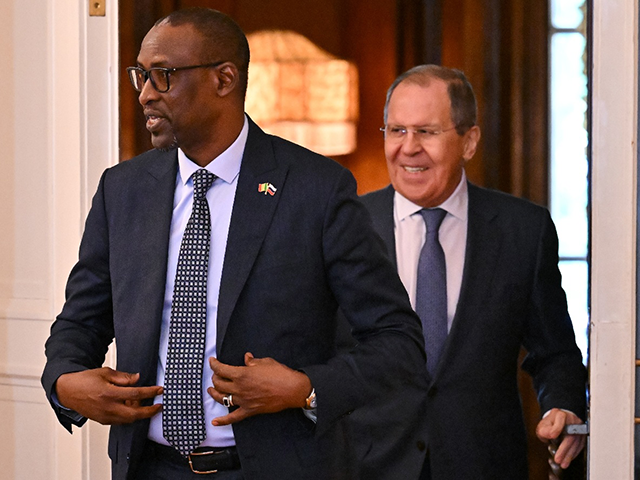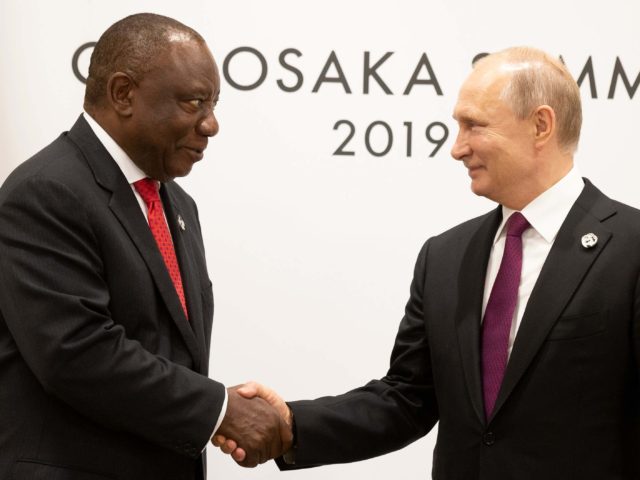Latin American and African nations made up the bulk of the small resistance on Thursday against condemning Russia on the anniversary of its “special operation” against Ukraine during a vote at the United Nations General Assembly.
The General Assembly voted Thursday on a resolution that calls for Russia to withdraw its forces and end its invasion of Ukraine. The Assembly overwhelmingly approved the resolution with 141 votes. Prominently Russian allies such as Syria and North Korea voted against the resolution, but, prominently, many African and Latin American states abstained from the vote, refusing to support the condemnation.
The vote was evidence of growing and unchecked Russian influence in Africa and Latin America countries, fueled by trade deals, geopolitical support, and military assistance.
The results of the vote showed that Eritrea, Mali, and Nicaragua were the African and Latin American countries that joined Belarus, North Korea and Syria in voting against the U.N. resolution. Algeria, Cuba, Namibia, South Africa, and Zimbabwe abstained alongside Armenia, China, Iran, and Pakistan.
Over the past decade, Russia has made great efforts to expand its influence on African nations at a political and economic level through the use of propaganda, arms sales, mining activities, and mercenaries to help governments maintain control of their countries.
While in some cases Russia has aided African nations through the restoration of cathedrals and donations to build school classrooms, in others, such as Mali — which voted against the U.N. resolution — Russia has provided continued support to the ruling junta that overthrew the elected government in 2020. Mercenaries from the Russian Wagner Group private military contractor reportedly provide aid to the ruling junta regime, which has resulted in accusations of war crimes and crimes against humanity committed by both Mali’s government forces and mercenaries from the Wagner Group.
Russian Foreign Minister Sergei Lavrov recently visited Mali to extend Moscow’s influence on the African nation.

Russian Foreign Minister Sergei Lavrov (right) and his Malian counterpart Abdoulaye Diop met in Moscow on May 20, 2022. (AFP)
Eritrea, ruled by the notoriously anti-American dictatorship of Isaias Afwerki, has maintained a strong pro-Russia stance throughout time. The African nation was also among those that voted against the U.N. General Assembly’s March 2022 resolution that demanded Russia end its invasion of Ukraine.
Eritrea has continuously voted against U.N. resolutions related to the ongoing Russian invasion of Ukraine, such as voting alongside Russia against the launching of a United Nations Human Rights Council panel to oversee the Ukrainian conflict.
Algeria, which chose to abstain on Thursday, expressed in August its intention to begin talks to join the BRICS economic group, of which Russia and China are part of alongside Brazil, India, and South Africa. The gas exports of the African nation saw record highs during 2022, marked by the European Union’s search for alternatives to Russian energy sources.
In January, both Russia and South Africa, which abstained on Thursday, expressed their intention to strengthen their bilateral ties during Russian Foreign Minister Sergei Lavrov’s visit to Pretoria. Both countries began naval exercise drills earlier this week.
In the case of Latin American countries, support for Russia in the recent U.N. General Assembly vote came from the authoritarian — and directly ideologically aligned — regimes of the region: Cuba and Nicaragua.
The socialist regime of Venezuela, whose ever-growing Russian support ranges from the economic to offering military bases and weaponry, was a notable exception in the recent U.N. vote — not because of any disagreement with Russia, but because the Maduro regime is unable to cast votes of any kind at the U.N. General Assembly. The country lost voting rights at the Assembly in January over unpaid dues. The Maduro regime owes upwards of $76 million to the United Nations as of January 2023.
Shortly before the beginning of Russia’s invasion of Ukraine in 2022, Vladimir Putin announced Russia’s intention of strengthening its cooperation with the three rogue Latin American nations “in all areas,” including military.
The communist Castro regime, a close ally of the Soviet Union, has continued to receive military support from Russia, including a direct $50-million loan in 2018 to buy Russian weaponry, increasing its influence on the island-nation in recent years.
In 2022, both Cuba and Russia expressed their intention to deepen military cooperation as a follow-up to the visit of Castro regime figurehead president Miguel Díaz-Canel to Russia in 2019.
During the second half of 2022, the authoritarian Sandinista regime of Daniel Ortega allowed the presence of Russian military forces in its territory. The indeterminate number of Russian troops, ships, and warplanes were allegedly sent to Nicaragua to conduct “humanitarian aid, rescue and search missions in emergencies” and “law enforcement against illicit activities.”
Russian authorities have denied that their presence in Nicaragua was an effort by the Ortega regime to open the doors for the Russian military in the region.
In August, Vladimir Putin announced Russia’s intention to expand arms trade with its socialist allies in Latin America, as well as allied nations in Asia and Africa.
Christian K. Caruzo is a Venezuelan writer and documents life under socialism. You can follow him on Twitter here.

COMMENTS
Please let us know if you're having issues with commenting.